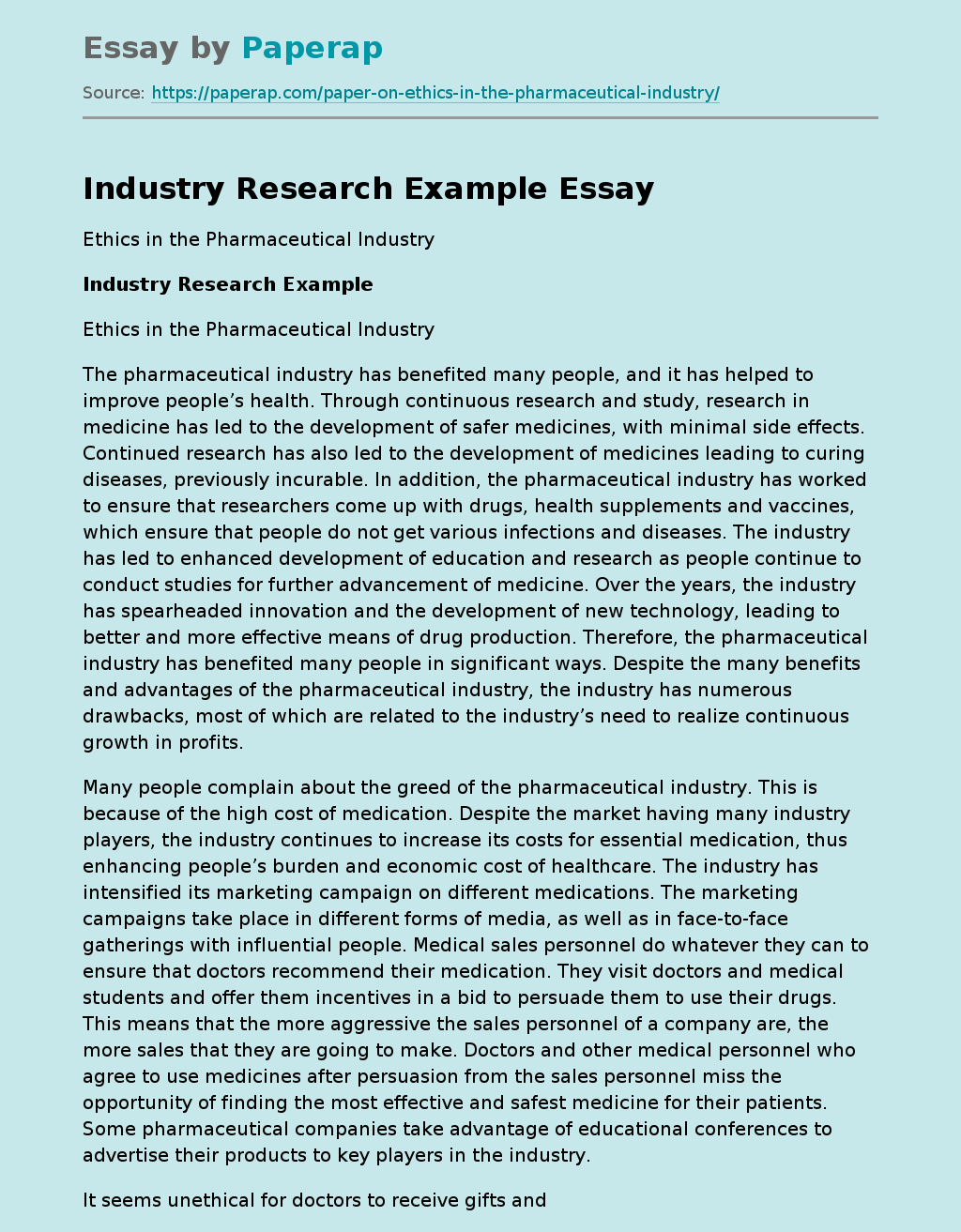Ethics in the Pharmaceutical Industry
The following sample essay on “Ethics in the Pharmaceutical Industry”: pharmaceutical industry and how it benefited many people or helped to improve people’s health.
The pharmaceutical industry has benefited many people, and it has helped to improve people’s health. Through continuous research and study, research in medicine has led to the development of safer medicines, with minimal side effects. Continued research has also led to the development of medicines leading to curing diseases, previously incurable. In addition, the pharmaceutical industry has worked to ensure that researchers come up with drugs, health supplements and vaccines, which ensure that people do not get various infections and diseases.
The industry has led to enhanced development of education and research as people continue to conduct studies for further advancement of medicine. Over the years, the industry has spearheaded innovation and the development of new technology, leading to better and more effective means of drug production. Therefore, the pharmaceutical industry has benefited many people in significant ways.
Despite the many benefits and advantages of the pharmaceutical industry, the industry has numerous drawbacks, most of which are related to the industry’s need to realize continuous growth in profits.
Many people complain about the greed of the pharmaceutical industry. This is because of the high cost of medication. Despite the market having many industry players, the industry continues to increase its costs for essential medication, thus enhancing people’s burden and economic cost of healthcare. The industry has intensified its marketing campaign on different medications.
The marketing campaigns take place in different forms of media, as well as in face-to-face gatherings with influential people. Medical sales personnel do whatever they can to ensure that doctors recommend their medication. They visit doctors and medical students and offer them incentives in a bid to persuade them to use their drugs. This means that the more aggressive the sales personnel of a company are, the more sales that they are going to make. Doctors and other medical personnel who agree to use medicines after persuasion from the sales personnel miss the opportunity of finding the most effective and safest medicine for their patients. Some pharmaceutical companies take advantage of educational conferences to advertise their products to key players in the industry.
It seems unethical for doctors to receive gifts and perks from pharmaceutical companies. Some pharmaceutical companies do this so that they can coerce or encourage the doctors to use their medicines or medical equipment. Theories of utilitarianism or consequentialism can condemn the decision by the doctors to accept gifts from pharmaceutical companies. Utilitarianism focuses on the consequences of an action. Applying utilitarianism to an ethical issue highlights the need and importance of observing the consequence of one’s action, and determining if that action will benefit the most people. If the said action will lead to negative consequences, then a person should not take that specific course of action. On the other hand, if the action benefits most people then one should consider taking that action (Geirsson & Holmgren, 2010). It involves examining all the possibilities closely, to determine the consequences of each alternative. When doctors decide to use drugs or equipment from a pharmaceutical company, just because the company has offered them a gift, then that doctor acts unethically. The doctors have not taken the time to determine what consequences their actions will have on their patients. For a pharmaceutical company to use the idea of gifts to convince the doctors to use their products, it means that their drugs are not effective enough, or that they have some drawbacks, such as negative side effects.
The pharmaceutical companies engage in such activities when they want the doctors or the medical students to use their products. Some companies go to the extent of sponsoring trips for doctors or sponsoring conferences. Such events give the pharmaceutical companies a chance to educate the health professionals concerning their products. They use the opportunity to demonstrate the correct use of medical equipment, and they give the doctors to ask questions about any of the products. This means that the doctors will not commit any errors in medical procedures. The companies realize that the more doctors use their products, the more sales they make, and hence increased profits for the companies (Santoro & Gorrie, 2005). Pharmaceutical companies do not want to be associated with faulty products because they understand that this can mean decreased sales and negative reviews. When people have a negative perception concerning the company’s products, the company faces a risk of making losses or even closure. Because of this, pharmaceutical companies take the initiative of marketing quality products. They take the time to train the medical personnel on how to use the products so that they can have positive results.
The government has the responsibility of ensuring the safety of the people. It has to ensure that the pharmaceutical companies develop products that are safe for human and animal use. Therefore, it has to take stringent measures and regulate the companies’ activities beginning at the development stage. At the same time, the government wants to create an enabling environment for businesses because this leads to the country’s economic growth. The government wants to ensure that pharmaceutical companies are able to operate well in the country. Encouraging business will lead to more jobs for the people. It will also lead to innovation in technology. The pharmaceutical companies are involved in conducting research, which leads to the development of better and more effective products. The industry has the responsibility of ensuring that pharmaceutical companies follow the regulations so that they can produce quality products. Failure to do so leads to a tainted image of the industry, and lack of trust among the people. Therefore, pharmaceutical companies take an active role in persuading the doctors to use their products, and in showing them the correct way of doing so.
Ethics in the Pharmaceutical Industry. (2019, Dec 05). Retrieved from https://paperap.com/paper-on-ethics-in-the-pharmaceutical-industry/

